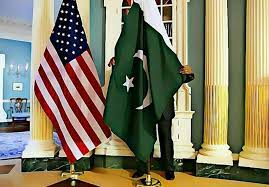US-Pakistan TIFA Council Ministerial concludes

Washington : The United States and Pakistan on Friday concluded the ninth meeting under the U.S. – Pakistan Trade and Investment Framework (TIFA). The meeting was chaired by United States Trade Representative Katherine Tai and Pakistan’s Minister for Commerce Syed Naveed Qamar.
The officials engaged on trade- and investment-related issues and concerns, including agriculture, digital trade, intellectual property protection and enforcement, labor rights, good regulatory practices, and women’s economic empowerment. Both governments resolved to increase dialogue on these topics, in order to deepen the economic bilateral relationship and further the prosperity of working people in both countries.
In recognition of the importance of agricultural and digital trade to the economic relationship, the Ministers directed officials to intensify engagement in these areas in advance of the next TIFA Council meeting.
The U.S. appreciated the efforts by Pakistan to improve worker rights and protections and strengthen its intellectual property regime. Both sides affirmed the importance of an effective IP regime, achieving high labor standards, and following good regulatory practices.
The U.S. welcomed the substantive conclusion of technical work on market access for beef from the United States; the ministers noted that work to operationalize this arrangement would be expedited.
Both sides expressed their intent to enhance engagement on market access and the reduction of barriers for additional agricultural products.
Pakistan welcomed the ongoing engagement on market access for its mangoes and fresh dates, and asked the U.S. to review additional market access requests for agricultural products once the current work is complete.
The Ministers issued a separate Joint Statement reflecting progress and commitments under the Memorandum of Understanding (MOU) on Joint Efforts to Empower Women and to Promote Women’s Entrepreneurship. The collaboration seeks to elevate women’s role in Pakistan’s long-term economic growth by supporting supplier diversity and inclusive value chains, mentorship and peer learning, and equitable and inclusive access to the global marketplace.
The Ministers looked forward to ongoing and regularized intersessional work under the TIFA during 2023, and to reconvening the TIFA Council in Islamabad in 2024.





